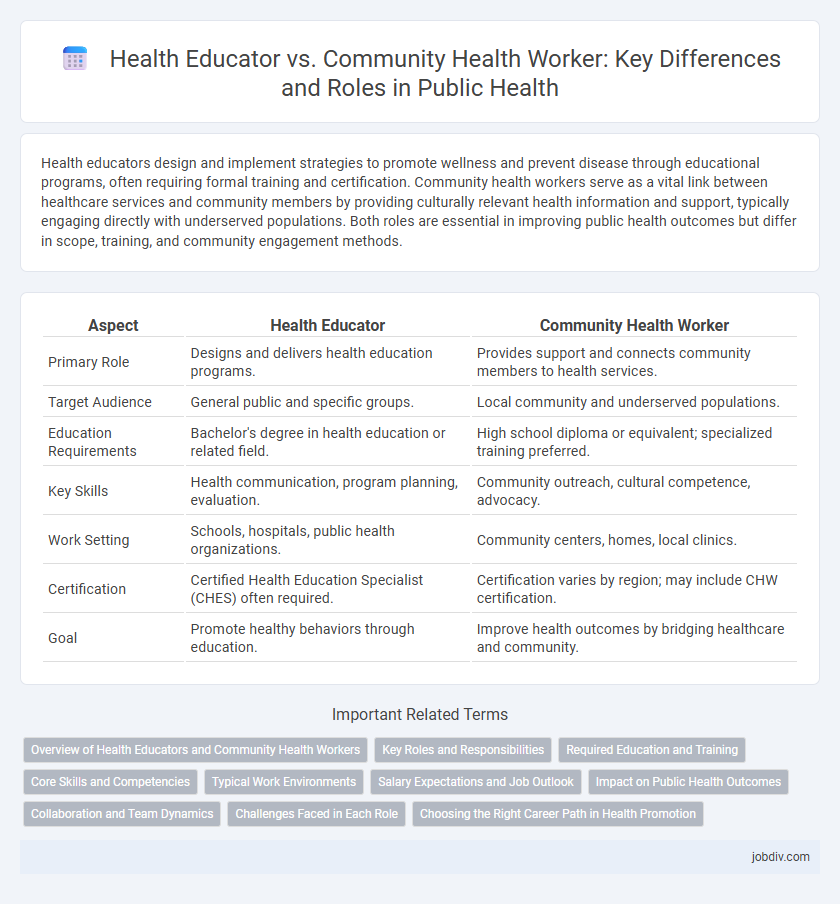Health educators design and implement strategies to promote wellness and prevent disease through educational programs, often requiring formal training and certification. Community health workers serve as a vital link between healthcare services and community members by providing culturally relevant health information and support, typically engaging directly with underserved populations. Both roles are essential in improving public health outcomes but differ in scope, training, and community engagement methods.
Table of Comparison
| Aspect | Health Educator | Community Health Worker |
|---|---|---|
| Primary Role | Designs and delivers health education programs. | Provides support and connects community members to health services. |
| Target Audience | General public and specific groups. | Local community and underserved populations. |
| Education Requirements | Bachelor's degree in health education or related field. | High school diploma or equivalent; specialized training preferred. |
| Key Skills | Health communication, program planning, evaluation. | Community outreach, cultural competence, advocacy. |
| Work Setting | Schools, hospitals, public health organizations. | Community centers, homes, local clinics. |
| Certification | Certified Health Education Specialist (CHES) often required. | Certification varies by region; may include CHW certification. |
| Goal | Promote healthy behaviors through education. | Improve health outcomes by bridging healthcare and community. |
Overview of Health Educators and Community Health Workers
Health Educators design and implement strategies to promote wellness and prevent disease, often working within schools, hospitals, and public health organizations to educate individuals and communities. Community Health Workers serve as vital liaisons between healthcare systems and underserved populations, providing culturally relevant health information, support, and advocacy to improve access to care. Both roles emphasize health promotion and disease prevention but differ in scope, with Health Educators focusing on structured educational programs and Community Health Workers specializing in direct community engagement and outreach.
Key Roles and Responsibilities
Health Educators design and implement programs to promote wellness, focusing on behavior change through education, assessment, and evaluation of community health needs. Community Health Workers provide direct support by connecting individuals with healthcare services, offering culturally relevant health education, and advocating for underserved populations. Both roles collaborate to improve public health outcomes but differ in scope, with Health Educators emphasizing program development and Community Health Workers emphasizing community outreach and support.
Required Education and Training
Health Educators typically require a bachelor's degree in health education, public health, or a related field, often complemented by Certified Health Education Specialist (CHES) certification to validate their expertise. Community Health Workers usually need a high school diploma or equivalent, with specialized on-the-job training or certification programs tailored to community outreach and health promotion. Both roles emphasize practical skills in communication and health knowledge, but Health Educators demand more formal academic preparation and professional accreditation.
Core Skills and Competencies
Health Educators possess expertise in designing, implementing, and evaluating health education programs focused on behavior change, employing skills such as communication, instructional design, and health literacy promotion. Community Health Workers excel in culturally competent outreach, providing grassroots support through skills in community engagement, advocacy, and resource navigation to address social determinants of health. Both roles require strong interpersonal skills but differ primarily in their scope, with Health Educators emphasizing formal education and Community Health Workers emphasizing community-based support.
Typical Work Environments
Health Educators typically work in hospitals, schools, public health departments, and nonprofit organizations, delivering structured health programs and educational materials. Community Health Workers often operate in community centers, clinics, and patients' homes, providing personalized support and outreach to underserved populations. Both roles prioritize improving public health but differ in their primary settings and direct interaction levels with individuals.
Salary Expectations and Job Outlook
Health Educators typically earn a median annual salary of around $60,000, reflecting their specialized training and responsibilities in designing health promotion programs. Community Health Workers have a median salary closer to $42,000 but experience strong job growth projected at 13% through 2031 due to increasing demand for grassroots health advocacy. Both roles contribute significantly to public health, but Health Educators often pursue higher pay with advanced certifications while Community Health Workers benefit from expanding employment opportunities in underserved areas.
Impact on Public Health Outcomes
Health educators design and implement targeted programs aimed at increasing knowledge and promoting healthy behaviors, leading to measurable improvements in chronic disease prevention and health literacy. Community health workers bridge gaps between healthcare systems and underserved populations by providing culturally relevant outreach, which enhances access to care and reduces health disparities. Both roles are essential for optimizing public health outcomes through education, prevention, and community engagement.
Collaboration and Team Dynamics
Health Educators and Community Health Workers collaborate closely to enhance public health outcomes by combining their expertise in health promotion and community engagement. Effective team dynamics hinge on clear communication, shared goals, and mutual respect, enabling them to address diverse population needs efficiently. Leveraging their complementary skills fosters a holistic approach to health education and advocacy within communities.
Challenges Faced in Each Role
Health Educators often face challenges related to developing tailored educational materials that address diverse literacy levels and cultural backgrounds, requiring constant adaptation to meet community needs effectively. Community Health Workers encounter obstacles such as limited resources, high caseloads, and navigating complex social determinants of health while building trust within underserved populations. Both roles demand resilience and cultural competence to overcome barriers in promoting health equity and access.
Choosing the Right Career Path in Health Promotion
Health educators design and implement programs that promote wellness and prevent disease by providing scientific information and health resources in various settings including schools, hospitals, and workplaces. Community health workers serve as liaisons between health services and community members, often providing culturally relevant education and support tailored to local populations. Selecting the right career path involves considering factors such as desired level of direct community involvement, required education credentials, and specific health promotion goals.
Health Educator vs Community Health Worker Infographic

 jobdiv.com
jobdiv.com